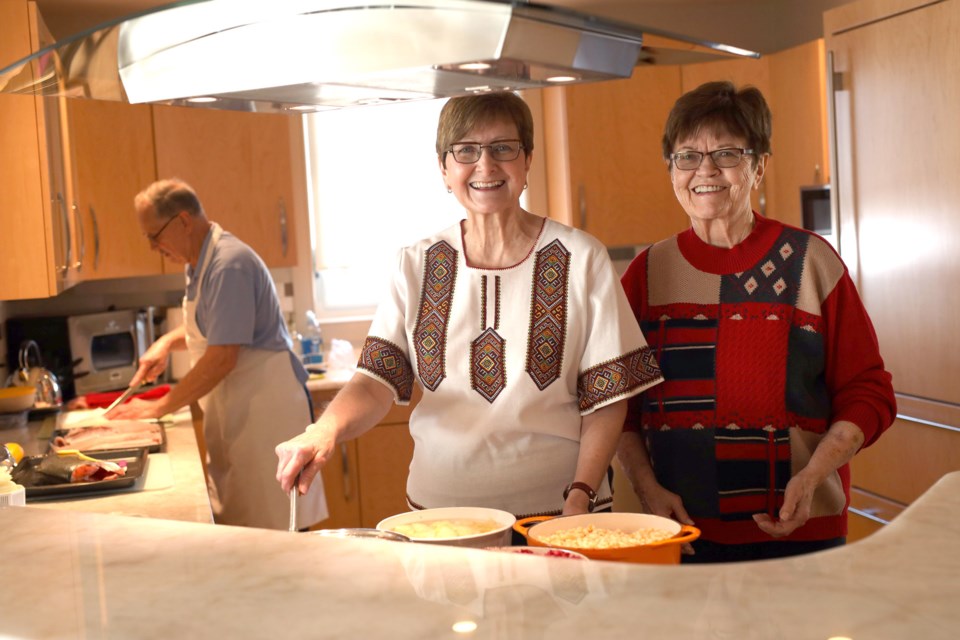Orthodox Christians around the globe are celebrating Christmas Day today, Jan. 7, the Feast of the Nativity according to the Gregorian calendar. Among them is Caroline Yewchin, a St. Paul resident who gathered with family and friends for a traditional Sviat Vechir – Christmas Eve meal last night, something she has celebrated since childhood.
“From when I was a young child, my parents carried on this tradition from my Baba and Gido. So, we’ve done this every year non-stop,” Yewchin said Monday morning.
This Christmas is all about celebrating Christ’s birth, Yewchin said, noting there are no presents, with the focus being on the “religious and spiritual” celebration of the nativity.
Yewchin was preparing to host a group of 15 to share the traditional meal featuring 12 meatless dishes, representing the 12 apostles and the culmination of 40 days of fasting.
“It’s something we look forward to every year and it doesn’t matter if everyone is working. In our family we take that time off to celebrate.”
The meal begins once the first star, representative of the Star of Bethlehem, appears in the night sky. A Christmas carol, God Eternal, is sung followed by a prayer and then the first course of Kutya, cooked wheat with honey is served.
“It starts our meal as a way of starting our year with sweetness,” Father Peter Haugen of the All Saints Ukrainian Orthodox Church in St. Paul, said Monday of the Orthodox celebration, which he explained is full of symbolism.
“There’s a fabulous old tradition, that I’ve never actually seen done, where you take a spoonful and you flick it on the ceiling and if it sticks that means it’s going to be a bountiful and prosperous farming year.”
Haugen said there is much symbolic reference to be found in the Orthodox traditions of Christmas Eve.
“Everything that is represented, represents not only a bountiful farming but thanksgiving to God. Everything is very inclusive of family and remembering the ancestors that came before us. So much so, that many families will also place an empty place setting that would be used to represent all the deceased members of the family that are no longer with us, but it is also practical in that if somebody came to the door and a weary traveler was needing a meal then you were ready to go and you could have that hospitality and that graciousness at the ready,” Haugen said.
“It was two-fold in that you were remembering your ancestors and your loved ones, but you were also ready if someone should arrive and need a meal, which was beautiful village mentality.”
This year was going to be a particularly special celebration for his congregation with the hosting of a midnight Nativity Divine Liturgy in the local church.
“We are returning to a tradition of actually having a midnight service which hasn’t been done here in quite a few years. It is traditional to have the liturgy for the feast days of the nativity as well as Paska, Easter, to actually have them at midnight.”
While Haugen said many Orthodox Christians have adopted a blended calendar and celebrate Christmas in December in keeping with the Julien calendar, he believes many people, particularly within the Slavic communities, continue to celebrate Christ’s birth at this time of year.
“It’s no longer a universal Orthodox practice but it has largely remained a Slavic practice. I know many, many families that are preparing for tonight and still take the 6th and 7th off because they are preparing for their Christmas. I’m also aware that my window is somewhat narrowed because I’m familiar with those that are familiar with my traditions,” he said.
“I think that anybody in any way can hold onto their traditions and keep them relevant to their family, and hold onto the things that remind us of our ancestors. I think those are valiant efforts in whatever form or shape they take.”


